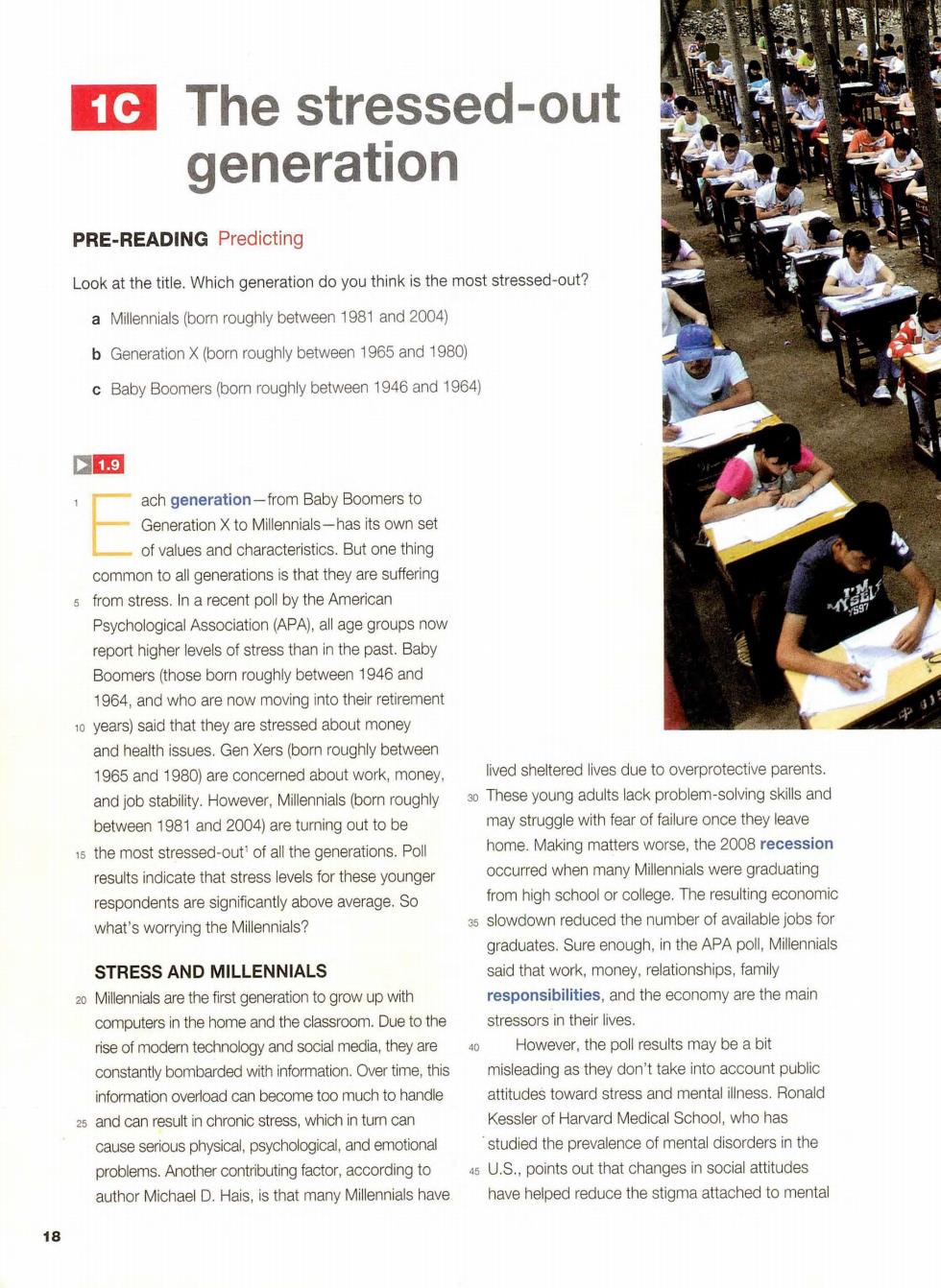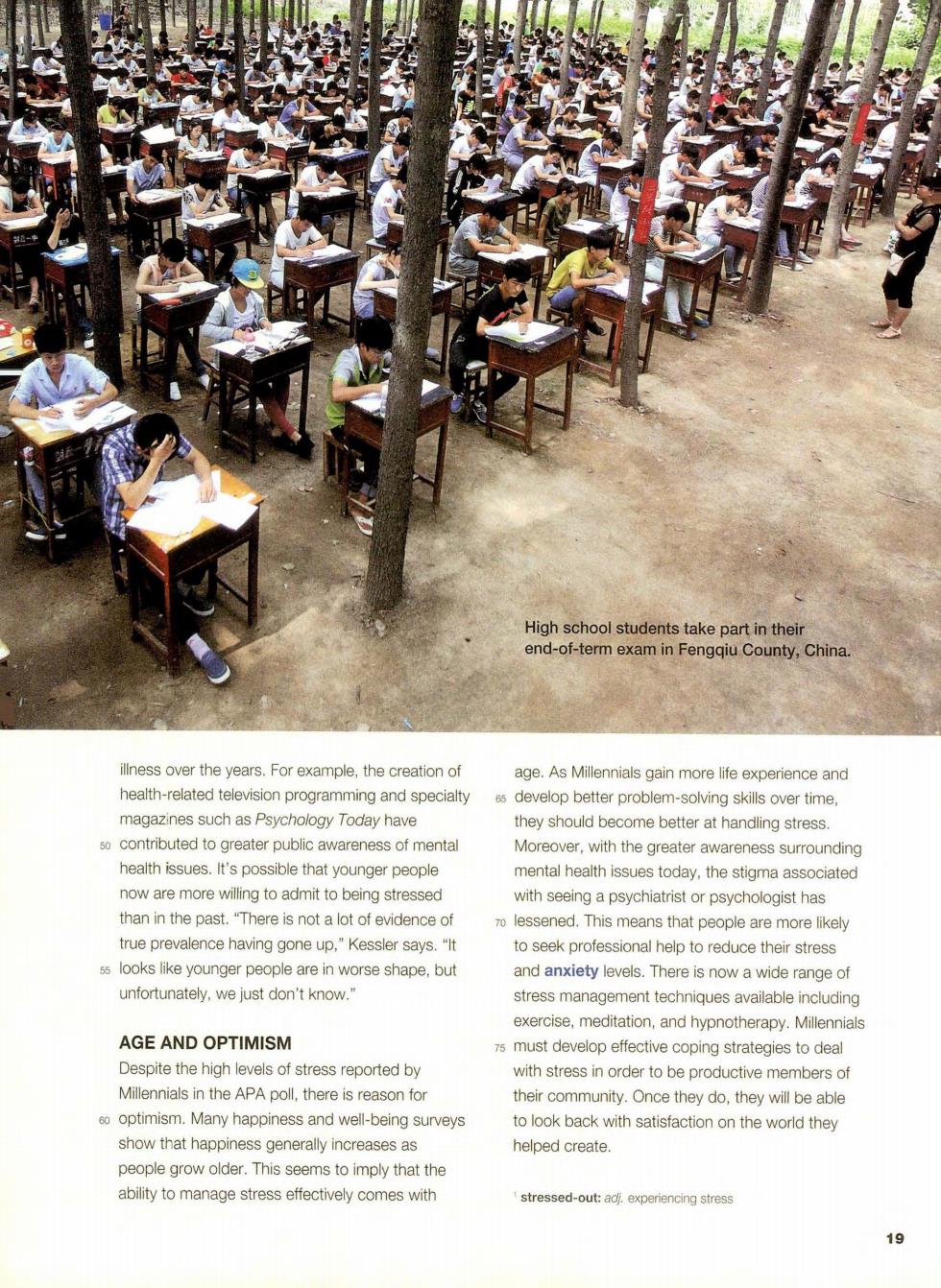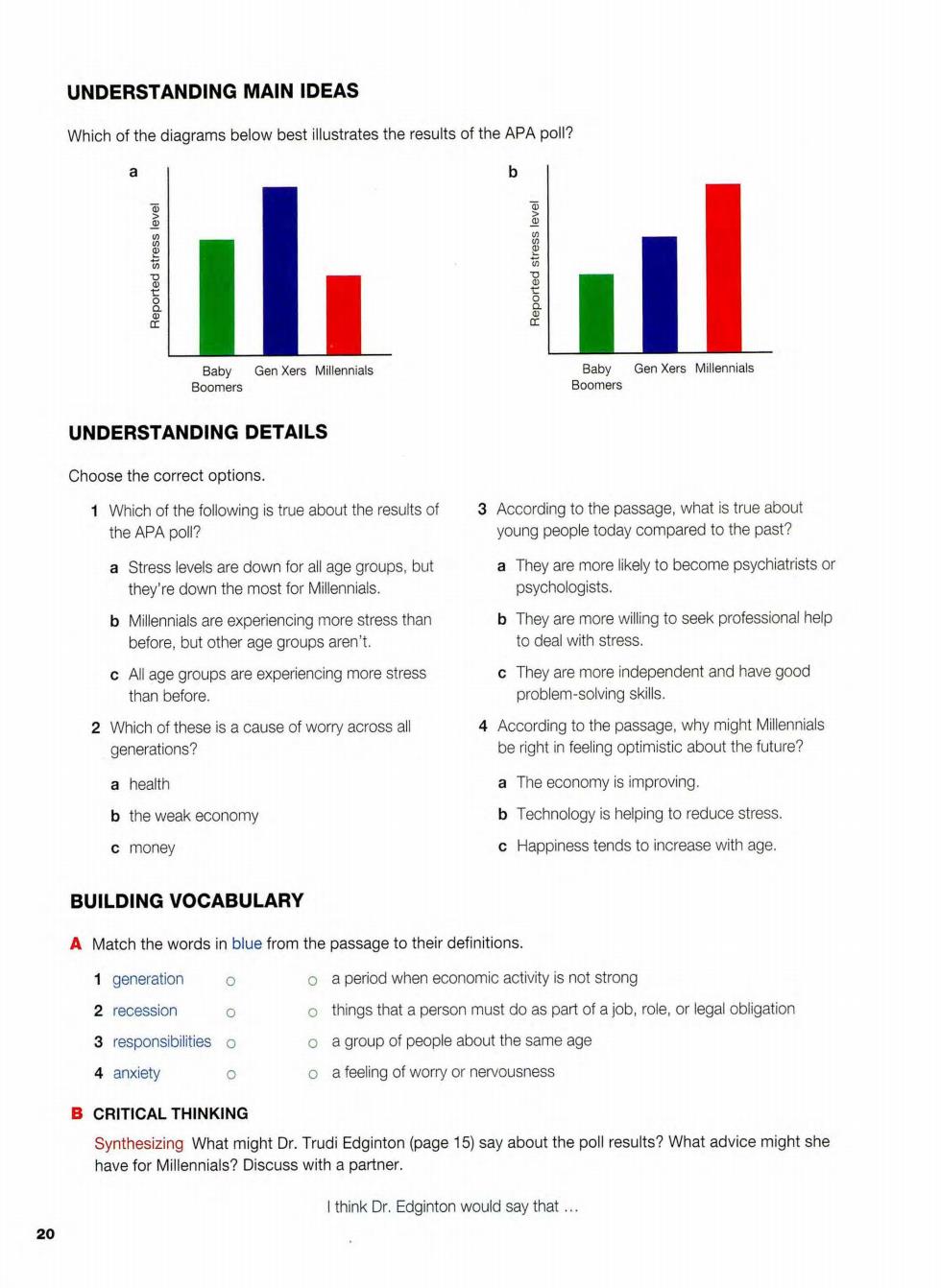
1C The stressed-out generation PRE-READING Predicting Look at the title.Which generation do you think is the most stressed-out? a Millennials (bom roughly between 1981 and 2004) b Generation X (born roughly between 1965 and 1980) c Baby Boomers (bom roughly between 1946 and 1964) 1.g ach generation-from Baby Boomers to Generation X to Millennials-has its own set of values and characteristics.But one thing commn to all generations is that they are suffering s from stress.In a recent poll by the American Psychological Association(APA).all age groups now report higher levels of stress than n the past.Baby Boomers(those bomn roughly between 1946 and 1964.and who are now moving into their retirement years)said that they are stressed about money and health issues.Gen Xers(bor roughly between 1965 and 1980)are concerned about work,money lived sheltered lives due to overprotective parents and iob stability.However.Millennials (bom roughly These young adults lack problem-soving skills and 200)are tumning out to be may struggle with fear of failure once they leave s the most stressed-out'of all the generations.Poll home.Making matters worse.the 2008 recession results indicate that stress levels for these younger occurred when many Milennials were graduating respondents are significantly above average.So from high school or college.The resulting economic what's womrying the Millennials? slowdown reduced the number of available jobs for graduates.Sure enough,in the APA poll,Millennials STRESS AND MILLENNIALS said that work,money,relationships,family 2o Millennials are the first generation to grow up with responsibilities,and the economy are the main computers in the home and the class om.Due to the stressors in their lives. nise of modem technology and social media,they are However.the poll results may be a bit constantly bombarded with information.Over time,this misleading as they don't take into account public information overload can become too much to handle attitudes toward stress and mental illness.Ronald and can result in chronic stress,which in tum can Kessler of Harvard Medical School.who has cause serious physical,psychological,and emotiona studied the in the problems.Another contributing factor,according to 4sU.S..points out that changes in social attitudes author Michael D.Hais,is that many Millennials have have helped reduce the stigma attached to mental
18 1C -OU • enera 10n PRE-READING Predicting Look at the title. Which generation do you think is the most stressed-out? a Millennials (born roughly between 1981 and 2004) b Generation X (born roughly between 1965 and 1980) c Baby Boomers (born roughly between 1946 and 1964) 1 ach generation -from Baby Boomers to Generation X to Millennials-has its own set of values and characteristics. But one thing common to all generations is that they are suffering s from stress. In a recent poll by the American Psychological Association (APA), all age groups now report higher levels of stress than in the past. Baby Boomers (those born roughly between 1946 and 1964, and who are now moving into their retirement ,o years) said that they are stressed about money and health issues. Gen Xers (born roughly between 1965 and 1980) are concerned about work, money, and job stability. However, Millennials (born roughly between 1981 and 2004) are turning out to be 1s the most stressed-out1 of all the generations. Poll results indicate that stress levels for these younger respondents are significantly above average. So what's worrying the Millennials? STRESS AND MILLENNIALS 20 Millennials are the first generation to grow up with lived sheltered lives due to overprotective parents. 30 These young adults lack problem-solving skills and may struggle with fear of failure once they leave l1ome. Making matters worse, the 2008 recession occurred when many Millennials were graduating from high school or college. The resulting economic 35 slowdown reduced the number of available jobs for graduates. Sure enough, in the APA poll, Millennials said that work, money, relationships, family responsibilities, and the economy are the main computers in the home and the classroom. Due to the stressors in their lives. rise of modern technology and social media, they are 40 However, the poll results may be a bit constantly bombarded with information. Over time, this information overload can become too much to handle 2s and can result in chronic stress, which in turn can cause serious physical, psychological, and emotional proble1T1s. Another contributing factor, according to author Michael D. Hais, is that many Millennials have misleading as they don't take into account public attitudes toward stress and mental illness. Ronald Kessler of Harvard Medical School, who has • studied the prevalence of mental disorders in the 45 U.S., points out that changes in social attitudes have helped reduce the stigma attached to mental

High school students take p lness over the years.For example,the creation of age.As Millennials gain more life experience and health-related television programming and specialty develop better problem-solving skills over time. magazines such as Psychology Today have they should become better at handling stress. s contributed to greater public awareness of mental Moreover,with the greater awareness surounding heath issues.It's possible that younger people mental health issues today,the stigma associated now are more willing to admit to being stressed with seeing a psychiatrist or psychologist has than in the past."There is not a lot of evidence of lessened.This means that people are more likely true prevalence having gone up,"Kessler says."t looks like younger people are in worse shape,but and anxiety levels.There is now a wide range of unfortunately.we just don't know.' stress management techniques available includino xercise,meditation,and hypnotherapy.Millennial AGE AND OPTIMISM s must develop effective coping strategies to deal Despite the high levels of stress reported by with stress in order to be productive members of Millennials in the APA poll.there is reason for their community.Once they do.they will be able optimism.Many happiness and well-being surveys olook back with satisfaction on the world they show that happiness generally increases as helped create. people grow older.This seems to imply that the ability to manage stress effectively comes with stressed-out:ad experiencing stress 19
.. illness over the years. For example, the creation of health-related television programming and specialty magaz;nes such as Psychology Today have 50 contributed to greater public awareness of mental health ;ssues. It's possible that younger people now are more willing to admit to being stressed than in the past. "There is not a lot of evidence of true prevalence having gone up," Kessler says. "It 55 looks like younger people are in worse shape, but unfortunately, we just don1 t know." AGE AND OPTIMISM Despite the high levels of stress reported by Millennials in the APA poll, there is reason for 60 optimism. Many happiness and well-being surveys show triat happiness generally increases as people grow older. This seems to imply that the ability to manage stress effectively comes with - ... ... • ... High school students take part in their end-of-term exam in Fengqiu County, China'! age. As Millennials gain more life experience and 65 develop better problem-solving skills over time, they should become better at handling stress. Moreover, with the greater awareness surrounding mental health issues today, the stigma associated with seeing a psychiatrist or psychologist has 10 lessened. This means that people are more likely to seek professional help to reduce their stress and anxiety levels. There is now a wide range of stress management techniques available including exercise, meditation, and hypnotherapy. Millennials 15 must develop effective coping strategies to deal with stress in order to be productive merTlbers of their community. Once they do, they will be able to look back with satisfaction on the world they helped create. • stressed-out: adj. experiencing stress • 19

UNDERSTANDING MAIN IDEAS Which of the diagrams below best illustrates the results of the APA poll? Baby Gen Xers Millennials Baby Gen Xers Millennials Boomers Boomers UNDERSTANDING DETAILS Choose the correct options. 1 Which of the following is true about the results of 3 According to the passage,what is true about the APA poll? young people today compared to the past? a Stress levels are down for all age groups,but a They are more likely to become psychiatrists or they're down the most for Millennials. psychologists. b Millennials are experiencing more stress than b They are more willing to seek professional help before,but other age groups aren't. to deal with stress. c All age groups are experiencing more stress c They are more independent and have good than before. problem-solving skills. 2 Which of these is a cause of worry across all 4 According to the passage,why might Millennials generations? be right in feeling optimistic about the future? a health a The economy is improving. b the weak economy b Technology is helping to reduce stress c money c Happiness tends to increase with age. BUILDING VOCABULARY A Match the words in blue from the passage to their definitions. 1 generation o a period when economic activity is not strong 2 recession o things that a person must do as part of a job,role,or legal obligation 3 responsibilities o o a group of people about the same age 4 anxiety 0 o a feeling of worry or nervousness B CRITICAL THINKING Synthesizing What might Dr.Trudi Edginton(page 15)say about the poll results?What advice might she have for Millennials?Discuss with a partner. I think Dr.Edginton would say that... 20
20 UNDERSTANDING MAIN IDEAS Which of the diagrams below best illustrates the results of the APA poll? a Q) > Q) - Cl) Cl) Q) I... +-' Cl) '"O Q) t 0 a. Q) er: Baby Gen Xers Millennials Boomers UNDERSTANDING DETAILS Choose the correct options. 1 Which of the following is true about the results of the APA poll? a Stress levels are down for all age groups, but they're down the most for Millennials. b Millennials are experiencing more stress than before, but other age groups aren't. c All age groups are experiencing more stress than before. 2 Which of these is a cause of worry across all generations? a health b the weak economy c money BUILDING VOCABULARY b Q) > Q) - Cl) Cl) Q) I... +-' Cl) '"O Q) t 0 a. Q) er: Baby Gen Xers Millennials Boomers 3 According to the passage, what is true about young people today compared to the past? a They are more likely to become psychiatrists or psychologists. b They are more willing to seek professional help to deal with stress. c They are more independent and have good problem-solving skills. 4 According to the passage, why might Millennials be right in feeling optimistic about the future? a The economy is improving. b Technology is helping to reduce stress. c Happiness tends to increase with age. A Match the words in blue from the passage to their definitions. 1 generation 2 recession 0 0 3 responsibilities o 4 anxiety 0 B CRITICAL THINKING o a period when economic activity is not strong o things that a person must do as part of a job, role, or legal obligation o a group of people about the same age o a feeling of worry or nervousness Synthesizing What might Dr. Trudi Edginton (page 15) say about the poll results? What advice might she have for Millennials? Discuss with a partner. I think Dr. Edginton would say that ... •